

Julien Galisson, 32 ans, #EnMémoire. A force, on avait oublié son prénom.
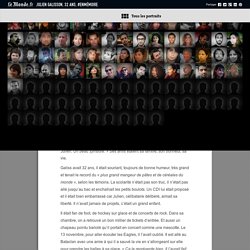
Julien avait tant d’amis qui s’appelaient Julien que tout le monde l’appelait Galiss, comme les deux premières syllabes de son nom, Galisson. Lors de ses funérailles, il y avait beaucoup de Julien et d’amis de tous les prénoms qui ne se connaissaient pas tous et s’étonnaient : comment Galiss avait-il des journées assez longues pour être aimé et intime de tant de gens ? L’une de ses proches, Cathy, a trouvé la réponse. « Julien, ce n’était que de la gentillesse. Il était très attentionné pour tout le monde. Ce n’est pas parce qu’il n’est plus là que je vous dis ça, je le répétais souvent, même avant. » Il avait instauré ce qui est devenu une tradition chez ses copains : « la boule de l’amour ».
What is the driving force behind jihadist terrorism? Because there is no general, open database of Islamic militants who have joined al Qaeda or ISIS in Europe, a scientific quantitative analysis is difficult to do.
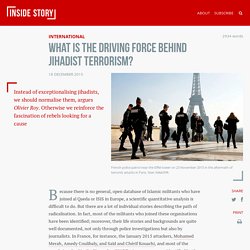
But there are a lot of individual stories describing the path of radicalisation. In fact, most of the militants who joined these organisations have been identified; moreover, their life stories and backgrounds are quite well documented, not only through police investigations but also by journalists. In France, for instance, the January 2015 attackers, Mohamed Merah, Amedy Coulibaly, and Saïd and Chérif Kouachi, and most of the people involved in the November 2015 Paris massacre were identified by the police as “radicals” before they went for action.
The data we use are taken from these open sources. There are two ways to define what a radical is. Beyond collecting individual stories, our objective is to understand the process of radicalisation in order to implement a policy of prevention and counter-radicalisation. 1. 2. 3. La propagande de Daech s'en prend à l'école française. Le magazine de l'État islamique Dar al Islam ordonne aux parents musulmans de retirer leurs enfants des écoles françaises et demande de tuer les professeurs qui y enseignent la laïcité.
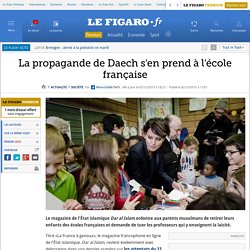
Titré «La France à genoux», le magazine francophone en ligne de l'État islamique, Dar al Islam, revient évidemment avec délectation dans son dernier numéro sur les attentats du 13 novembre à Paris. Lacombe «Jihad» Lucien. Le terrorisme s’est toujours appuyé sur des pauvres types pour exercer sa terreur.
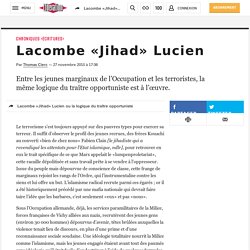
Il suffit d’observer le profil des jeunes recrues, des frères Kouachi au converti «bien de chez nous» Fabien Clain [le jihadiste qui a revendiqué les attentats pour l’Etat islamique, ndlr], pour retrouver en eux le trait spécifique de ce que Marx appelait le «lumpenproletariat», cette racaille dépolitisée et sans travail prête à se vendre à l’oppresseur. Former Isis hostage says airstrikes on Syria are a trap.
A French journalist held hostage by Islamic State for 10 months, has made an impassioned plea against bombing Syria, saying it was a trap that would only benefit Isis.
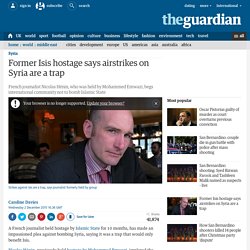
Nicolas Hénin, previously held hostage by Mohammed Emwazi, implored the international community to seek a political solution. Engaging with Syrians, not bombing them, was the surest way to bring about the collapse of Isis, he said. In a five-minute video said to have been recorded in the past few days in Paris and posted on YouTube by the Syria Campaign, Hénin said: “Strikes on Isis are a trap. The winner of this war will not be the parties that have the newest, most expensive, most sophisticated weaponry, but the party that manages to have the people on its side.” In his message, apparently timed to coincide with Wednesday’s UK parliament debate on joining Syria airstrikes, he said: “At the moment, with the bombings, we are more likely pushing the people into the hands of Isis.
“Mohammed Emwazi was one of my captors. Russia steps up hostility against Turkey with war room briefing. Although Turkey may have replaced the US as Russia’s rhetorical enemy No 1, the animations playing on the giant screens in Moscow’s new “war room” complex hadn’t yet been updated: they still featured the glowing red outline of North America under laser-like lines that seemed to suggest crosshairs.
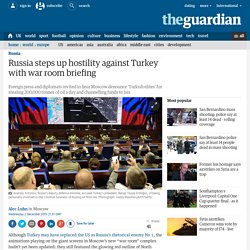
But an unexpected defence ministry briefing on Wednesday – the first such event for foreign media in recent memory – left no doubt who was in Russia’s sights. Sitting beneath the main screen, which now showed satellite images of the Turkish-Syrian border, the deputy defence minister, Anatoly Antonov, accused Turkey of buying oil from Islamic State (Isis), and claimed the Turkish president, Recep Tayyip Erdoğan, was personally involved in this “criminal business”.
“A unified team of bandits and Turkish elites operates in the region to steal oil from their neighbours [Iraq and Syria],” Antonov said. “We have no chance to check it at this time, but we will check,” he said.